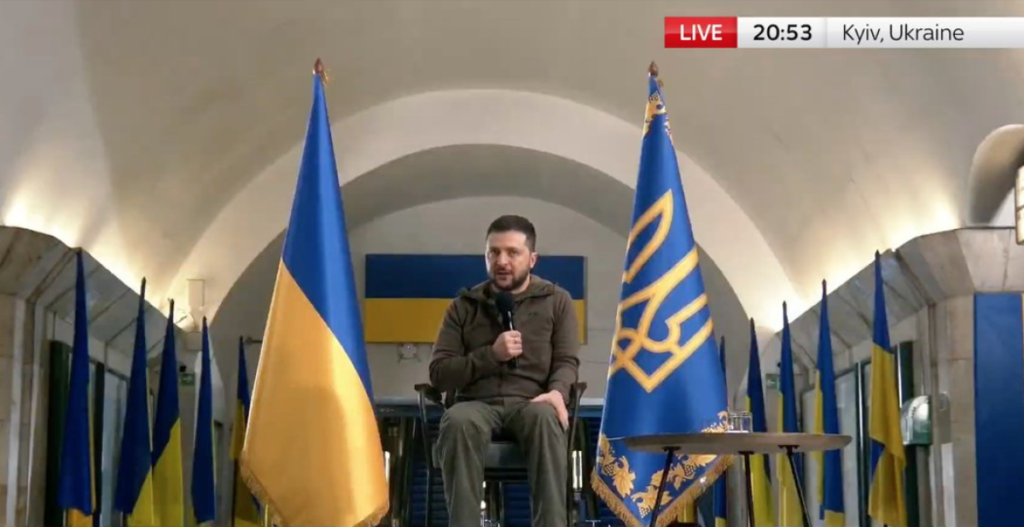
By Natylie Baldwin, The Grayzone, 4/28/22
Ukrainian academic Olga Baysha details Volodymyr Zelensky’s embrace of widely loathed neoliberal policies, his repression of rivals, and how his actions fueled the current war with Russia.
A comedic actor who rose to the country’s highest office in 2019, Volodymyr Zelensky was virtually unknown to the average American, except perhaps as a bit player in the Trump impeachment theater. But when Russia attacked Ukraine on February 24, 2022, Zelensky was suddenly transformed to an A-list celebrity in US media. American news consumers were bombarded with images of a man who appeared overcome by the tragic events, possibly in over his head, but ultimately sympathetic. It didn’t take long for that image to evolve into the khaki-clad, tireless hero governing over a scrappy little democracy and single-handedly staving off the barbarians of autocracy from the east.
But beyond that carefully crafted Western media image is something much more complicated and less flattering. Zelensky was elected by 73 percent of the vote on a promise to pursue peace while the rest of his platform was vague. On the eve of the invasion, however, his approval rating had sunk to 31 percent due to the pursuit of deeply unpopular policies.
Ukrainian academic, Olga Baysha, author of Democracy, Populism, and Neoliberalism in Ukraine: On the Fringes of the Virtual and the Real, has studied Zelensky’s rise to power and how he has wielded that power since becoming president. In the interview below, Baysha discusses Zelensky’s embrace of neoliberalism and increasing authoritarianism, how his actions contributed to the current war; his counterproductive and self-absorbed leadership throughout the war, the complex cultural and political views and identities of Ukrainians, the partnership between neoliberals and the radical right during and after Maidan, and whether a Russian takeover of the entire Donbass region might be less popular among the local population than it would have been in 2014.
Tell us a bit about your background. Where are you from and how did you become interested in your current area of study?
I am an ethnic Ukrainian born in Kharkov, a Ukrainian city on the borderline with Russia, where my dad and other relatives are still living. Before the current war, Kharkov was one of Ukraine’s leading educational and scientific centers. The city’s residents pride themselves on living in the “intellectual capital” of Ukraine. In 1990, the first television company free from party control was established there; soon, its first news program went on air. By that time, I had already graduated from Kharkov University, and one day, I was invited to work as a journalist in this program by a university friend. Next day, without prior experience, I started reporting. In a couple of months, I was a news presenter. My meteoric career was not an exception.
New uncontrolled media, the number of which was increasing at a huge rate daily, demanded more and more media workers. In the overwhelming majority of cases, they were young ambitious people without any journalistic education or life experience. What united us was the desire to westernize, a lack of understanding of societal contradictions characterizing the post-Soviet transition, and deafness to the concerns of working people who opposed reforms. In our eyes, the latter were “retrograde”: they did not understand what civilization was about. We saw [our]selves as a revolutionary vanguard and chosen progressive reformers. It is we—media workers—who created a favorable environment for Ukraine’s neoliberalization, presented as westernization and civilization, with all disastrous consequences for society they brought. Only years after, I realized this.
Later, while supervising the production of historical documentaries in a Kiev television company, I recognized that the mythology of unidirectional historical progress and inevitability of westernization for “barbarians” provided an ideological ground for neoliberal experiments not only in the former Soviet states but around the globe. It is this interest in the global hegemony of the ideology of westernization that led me first to the doctoral program in critical media studies at the University of Colorado at Boulder and then to the research I am doing now.
According to the academic work of some Ukrainian sociologists, polling showed in the recent past that most Ukrainians were not very interested in the issue of identity but were more concerned with issues like jobs, wages, and prices. Your work focuses a lot on the Neoliberal reforms that were enacted in Ukraine since 2019 – against the popular sentiment. Can you talk about what the view is on economic issues for most Ukrainians and why?
In the social milieus [in which] I lived — the east of Ukraine, Crimea, and Kiev — there were very few people concerned with the issue of ethnic identity. I do not in vain emphasize “my social milieus.” Ukraine is a complex and divided country with its far east and far west holding diametrically different views on all socially significant issues. Since the declaration of Ukraine’s independence in 1991, two ideas of national identity have been competing in Ukraine: “ethnic Ukrainian” versus “eastern Slavic.” The ethnic Ukrainian national idea, based on the notion that Ukrainian culture, language, and ethnicity-centered history should be the dominant integrating forces in the Ukrainian nation-state, has been much more popular in the west of Ukraine. The eastern Slavic idea, which envisages the Ukrainian nation as founded on two primary ethnic groups, languages, and cultures — Ukrainian and Russian — has been accepted as normal in the Ukrainian southeast. However, in general, I can agree that most Ukrainians are much more concerned with economic issues, which has always been the case.
As a matter of fact, Ukraine’s independence of 1991 was to a big extent also a matter of economic concerns. Many Ukrainians supported the idea of political divorce from Russia because of an expectation that Ukraine would be better off economically — this is what propagandistic leaflets promised us. This economic hope was not realized. In many ways, the collapse of the Soviet Union radically changed people’s lives for the worse because of Ukraine’s neoliberalization — the marketization of the social sphere and ruination of the Soviet welfare state.
What about neoliberal reforms initiated by Zelensky? You can judge on their popularity by opinion polls – up to 72% of Ukrainians did not support his land reform, the flagship of Zelensky’s neoliberal program. After his party approved it despite people’s indignation, Zelensky’s rating fell from 73 percent in Spring 2019 to 23 percent in January 2022. The reason is simple: a deep sense of betrayal. In his unofficial election platform — the show “Servant of the People” — Zelesnky-Holoborodko [Holoborodko was Zelensky’s character in the television show – NB] promised that if he could rule the country for just one week, he would “make the teacher live as the president, and the president live as the teacher.” To put it mildly, this promise was not fulfilled. People realized that they were duped once again—the reforms have been carried out in the interests of not Ukrainians but global capital.
To what extent do you think that prioritizing of economic security versus identity issues has changed with the Russian invasion? How do you think that will work out for the political fortunes of the nationalists/ultranationalists versus moderates or leftists?
That is an interesting question. On the one hand, people’s priority now is to survive, which makes security their primary concern. To save their lives, millions of Ukrainians, including my mom and my sister with children, have left Ukraine for Europe. Many of them are ready to stay there forever, to learn foreign languages, and to adopt to a foreign way of life—all these developments can hardly prioritize identity concerns. On the other hand, however, the intensification of ethnic sentiments and the consolidation of the nation in the face of the invasion is also evident. I can judge on this from public discussions in social media—some Kharkovites whom I know personally even started making posts in Ukrainian [language], which they had never used before, to highlight their national identity and signal that they are against any foreign invasion.
This is another tragic aspect of this war. The Maidan revolution of 2014, which many people in the southeast did not support, transformed these people into “slaves,” “sovki” and “vatniki”—derogatory terms to denote their backwardness and barbarism. This is how Maidan revolutionaries, who considered themselves the progressive force of history, saw anti-Maidan “others” because of their adherence to Russian language and culture. Never ever could this pro-Russian population imagine Russia to shell their cities and ruin their lives. The tragedy of these people is twofold: first, their world was ruined symbolically by the Maidan, now, it is being destroyed physically by Russia.
The outcomes of these developments are unclear so far as it is unclear how the war will end. If the southeastern regions remain in Ukraine, the ruination of everything resisting aggressive nationalism will most likely be completed. This will be probably the end of this unique borderline culture that has never wanted to be either completely Ukrainized or Russified. If Russia establishes control over these regions, as it boasts now, I can hardly predict how it will be dealing with mass resentment—at least, in the cities that are damaged significantly, as in Kharkov…
Read my full interview with Olga Baysha here.

